The Rwandan Adventure Continues – Days Four and Five
The Rwandan Adventure Continues – Days Four and Five
Days four and five have been spent teaching new Rwandan pastors. Each has less than a year of ordained ministry under his belt. They lead multiple local churches that form a parish. Some pastor 100 Anglican believers and others are already pastoring 2000. All fifteen of the newly ordained are participating.
We began the first day with a conversation about ministry context. What challenges do they face? The first challenge they identified was the overwhelming number of religious people as compared with those who are following Jesus. The second challenge they identified was the absence men from church life. Wow. You would have thought they were describing church life in the US. Of course their description is sadly appropriate for both.
My goal was to present a means of communicating the whole of the Bible in three major themes. The teaching is dubbed “Bound, Released, and Transformed: The Christian Life in Three Movements.”
The takeaways for the Rwanda pastor yesterday were the concept of the attractiveness of “forbidden fruit” and  concept of sins of commission and omission especially as related to Romans 7 and doing (commission) versus not doing (omission) we find in Paul.
concept of sins of commission and omission especially as related to Romans 7 and doing (commission) versus not doing (omission) we find in Paul.
The takeaway for today was simply the overwhelming grace of God that He would make alive people who were bound and dead. I struggled to adequately describe “freedom in Christ” and in the sense of Release. Several pastors were inclined to return to the law. They had a good laugh when I asked “you foolish Rwandans, who has bewitched you?” There was a hearty, and yet somewhat disorienting for a few, conversation about what Old Testament laws we no longer follow, from circumcision to observing the Sabbath. Some wanted to retain the tithe (10% as a command) while admitting the others (like kosher food and boiling a kid in milk) were appropriately jettisoned. As expected they struggled for a reason to make the distinction. We explored the discontinuity between the Old and New Testaments (or Covenants) as opposed to the often overstated continuity.
It has been most edifying in both directions. I look forward to teaching “Transformed” tomorrow.